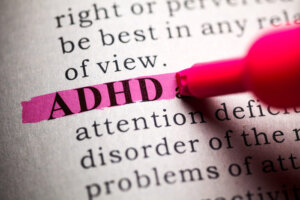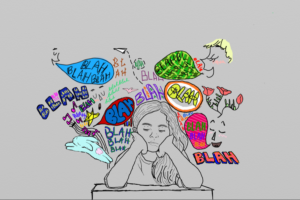You are NOT alone, there are others going through the same thing


ADHD (attention deficit hyperactivity disorder) is a lifetime disorder, but it’s not a death sentence. In fact, it is a condition that brings many gifts.
Common Signs and Symptoms:
Children

(CDC, 2023)
- having a short attention span and easily distracted
- making absentminded mistakes – for example, in schoolwork
- appearing forgetful or losing things
- being unable to adhere to tasks that are tedious or time-consuming
Adults

(Ballards Psychiatry, 2023)
- thoughtlessness and decreased attention to detail
- never fully finishing a task
- weak organizational skills
- trouble focusing or prioritizing
- forgetfulness
- restlessness and uneasiness
- hard time keeping quiet
Additional facts YOU should know about ADHD
- No person with ADHD presents the same
- Having ADHD does not mean you cannot focus
- ADHD is not just a childhood condition
- Medication is not always the answer
- Not everyone with ADHD is hyperactive
Living your best life, while managing ADHD
Learning how to manage symptoms is the first step of living positively with ADHD. Depending on your age, and lifestyle, management looks different for everyone. Standard treatments in adults and children diagnosed with ADHD consists of “medication, education, skills training and psychological counseling. A combination of these is often the most effective treatment” (Mayo Clinic 2023).
Do not be afraid to ask for help
If you are concerned that you or your child might have ADHD, talk to your healthcare provider and explain your symptoms and your doctor will determine if your symptoms fit the diagnosis of ADHD. The diagnosis can be made by a mental health professional, like a psychologist or psychiatrist, or by a primary care provider, like a pediatrician.

(Boston Medical Center, 2023)
Ignore STIGMA shown in the video. Not all ADHD symptoms present the same. It is common for two people to experience symptoms in different ways.
Decrease Stigma in simple steps
- Know the facts
- Educate yourself about mental illness including substance use disorders.
- Be aware of your attitudes and behavior
- Choose your words carefully
- Educate others
- Focus on the positive
- Support people
- Include everyone (CAMH, 2023)
Making an Impact
Getting out into the community, and sharing your story by making personal connections with others who have ADHD, and those who do not. Sharing your story of how ADHD affects your life and how you manage your symptoms can encourage others.
Support Groups for ADHD community


You do not have to have ADHD to be a supporter, you can be a friend or a family member, too. There are many support groups available, including non-profit organizations
- American Academy for Child and Adolescent Psychiatry
- Attention Deficit Disorder Association
- American Psychological Association
- American Psychiatric Association
- CHADD (Children and Adults with Attention-Deficit/Hyperactivity Disorder)*
By going to https://chadd.org/affiliate-locator/, you will be guided in the right direction to find a support group in your area.
ADHD is not a bad thing, and you should not feel differently from those without ADHD
Resources:
Addressing stigma. CAMH. (2023). https://www.camh.ca/en/driving-change/addressing-stigma
Adult ADHD. Ballard Psychiatry. (2023, October 12). https://www.ballardpsych.com/adult-adhd-seattle/
Centers for Disease Control and Prevention. (2023, September 27). Not just ADHD? helping children with multiple concerns. Centers for Disease Control and Prevention. https://www.cdc.gov/ncbddd/adhd/features/not-just-adhd.html
JUBRAIL, J., & CHETCUTI, B. (2022). Assessment and treatment of ADHD in adults. Prescriber.
Kern, R. M., Rasmussen, P. R., Boyd, S. L., & Wittschen , L. K. (2000). Lifestyle, Personality and Attention Deficit Hyperactivity Disorder. Journal of Individual Psychology, 55(2).Mayo Foundation for Medical Education and Research. (2023, January 25). Adult attention-deficit/hyperactivity disorder (ADHD). Mayo Clinic.
NHS. (2023). Attention Deficit Hyperactivity Disorder and Symptoms . NHS choices. https://www.nhs.uk/conditions/attention-deficit-hyperactivity-disorder-adhd/symptoms/
Revolutionizing equal access to Care & Health for ADHD. (2023). https://www.bumc.bu.edu/reach4adhd/research/psychometric-research-study/
Shikerkar, D., & Vajaratkar, P. V. (2022, September). Understanding Daily Routine and Schedule of Children with Attention-Deficit Hyperactivity Disorder: A Qualitative Study.
World Health Organization. (2023). Prevention. World Health Organization.
YouTube. (2016a). YouTube. Retrieved November 11, 2023, from https://www.youtube.com/watch?v=nm46PN_ksXU.
